
Former Scholars
The former IRACDA program, which began in 2001, provided significant opportunities for postdoctoral scholars. The current IRACDA program is an updated initiative funded by a new grant. Below is a list of scholars from the original program.
Program Completed in 2025
Sam Brunclik, PhD
Sam received his B.A. in Chemistry from St. Olaf College in Northfield, Minnesota in 2019 and went on to earn a Ph.D. in Chemistry from the University of Kansas in 2024 (supervised by Dr. Tim Jackson). Sam's graduate research focused on the study of bioinspired manganese model complexes, and the effects of changes to the ligand sphere on the stability and reactivity of those complexes, using both a combined synthetic and computational approach. Sam joined the IRACDA program under the advisement of Dr. Joanna Slusky, where he worked to use his knowledge of metal-ligand interactions to help advance a machine learning approach to enzyme classification and design. Sam is a strong advocate for LGBTQIA+ representation in STEM fields, and in Fall 2025 started as an Assistant Professor in the Chemistry Department at The College of St. Benedict and St. John’s University in Minnesota, fulfilling his goal to become a faculty member at a primarily undergraduate university, and help bring meaningful science experiences to undergraduate students.
Jay Sibbitts, PhD

Jay received his B.S. in Chemistry from Truman State University and his PhD in Analytical Chemistry from Kansas State University. His graduate research focused on the development and application of microfluidic technologies and techniques for the study of cancers and neuroinflammatory diseases. Jay joined the IRACDA program at the University of Kansas and worked with Dr. Susan Lunte in the Department of Chemistry. His research focused on developing single-cell analysis methodologies to enable a deeper understanding of neurodegenerative diseases, like Alzheimer's disease. In Fall 2025 Jay started as an Assistant Professor of Biochemistry at Truman State University, a primarily undergraduate institution in the State of Missouri.
Program Completed in 2024
Stephen Baca, PhD
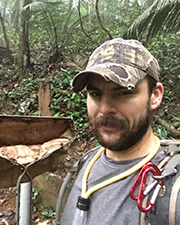 Stephen received his B.S. in Biology from the University of New Mexico and both an M.A. in Entomology and PhD in Ecology and Evolutionary Biology at the University of Kansas. His graduate research focused on the evolution and diversity of aquatic beetles, using various genetic methods to address questions across broad evolutionary timescales, 300Mya to present. Stephen entered the IRACDA program under the advisement Dr. Rob Moyle at the University of Kansas, where he is applying his genetic skillset to bird evolution, while learning new analytic techniques for parsing patterns of recent evolution in his aquatic beetles. Stephen is dedicated to increasing the participation of underrepresented demographics in STEM fields to represent the true diversity of our communities.
Stephen received his B.S. in Biology from the University of New Mexico and both an M.A. in Entomology and PhD in Ecology and Evolutionary Biology at the University of Kansas. His graduate research focused on the evolution and diversity of aquatic beetles, using various genetic methods to address questions across broad evolutionary timescales, 300Mya to present. Stephen entered the IRACDA program under the advisement Dr. Rob Moyle at the University of Kansas, where he is applying his genetic skillset to bird evolution, while learning new analytic techniques for parsing patterns of recent evolution in his aquatic beetles. Stephen is dedicated to increasing the participation of underrepresented demographics in STEM fields to represent the true diversity of our communities.
Jacob Cooper, PhD
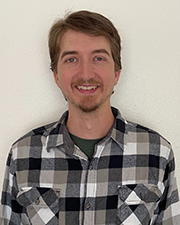 Jacob received his B.S. in biology from Louisiana State University, his M.A. in Ecology & Evolutionary Biology from the University of Kansas, and his M.S. and Ph.D. from the Committee on Evolutionary Biology from the University of Chicago. Having long been fascinated by birds, Jacob's research spans a wide breadth of ecological and evolutionary topics related to ornithology. His current research is focused primarily on the biogeography of birds and on the dynamics of species distributions. Jacob is an avid birder in his free time, and regularly contributes to and utilizes citizen science databases for his research. An ardent supporter of student research and experience, Jacob hopes to become a researcher and a lecturer to help students connect with the natural world while developing critical skills related to STEM research.
Jacob received his B.S. in biology from Louisiana State University, his M.A. in Ecology & Evolutionary Biology from the University of Kansas, and his M.S. and Ph.D. from the Committee on Evolutionary Biology from the University of Chicago. Having long been fascinated by birds, Jacob's research spans a wide breadth of ecological and evolutionary topics related to ornithology. His current research is focused primarily on the biogeography of birds and on the dynamics of species distributions. Jacob is an avid birder in his free time, and regularly contributes to and utilizes citizen science databases for his research. An ardent supporter of student research and experience, Jacob hopes to become a researcher and a lecturer to help students connect with the natural world while developing critical skills related to STEM research.
Rondy J. Malik, PhD
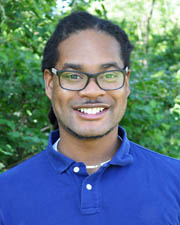 Originally from Mattapan, Mass., Rondy is a first-generation Haitian-American and an Ecologist at The Kansas Biological Survey. Rondy's training includes a B.Sc. in Biology from UMass-Boston (2013), and an M.Sc. in Evolution, Ecology & Behavior from Indiana University (2016); as well as a Ph.D. in Ecology from Penn State. Rondy's research interest spans the realm of applied and basic ecology. Rondy's past research topics have included the population structure of a non-indigenous weed, microbial bioprotection of crops, microbes in trophic ecology, and wood decomposition in eastern mixed hardwood forests. Currently, Rondy is interested in unraveling ways in which CO2 and microbes shape monarch's adaptive resource (i.e. milkweed).
Originally from Mattapan, Mass., Rondy is a first-generation Haitian-American and an Ecologist at The Kansas Biological Survey. Rondy's training includes a B.Sc. in Biology from UMass-Boston (2013), and an M.Sc. in Evolution, Ecology & Behavior from Indiana University (2016); as well as a Ph.D. in Ecology from Penn State. Rondy's research interest spans the realm of applied and basic ecology. Rondy's past research topics have included the population structure of a non-indigenous weed, microbial bioprotection of crops, microbes in trophic ecology, and wood decomposition in eastern mixed hardwood forests. Currently, Rondy is interested in unraveling ways in which CO2 and microbes shape monarch's adaptive resource (i.e. milkweed).
Program Completed in 2023
Christian Gomez, PhD
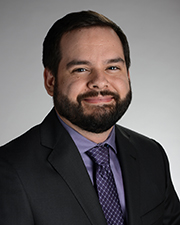 Christian received his B.S. in Biology from Washburn University before earning his Ph.D. in Molecular Biology from the University of Kansas. His doctoral thesis involved investigating a new function of a critical tumor suppressor protein in the mucus secreting cells of the intestinal tract. Christian joined the IRACDA program at the University of Kansas where he worked under Professor Dan Dixon in the Department of Molecular Biosciences. There he was evaluating drugs that could potentially be used to treat colon and pancreatic cancer, as well as the studying the mechanisms of how these drugs work. He plans to pursue a career in undergraduate education, hoping to raise students interests in STEM fields and research. At the beginning of 2023, he took an assistant professor of biology position at Baker University in Baldwin, KS.
Christian received his B.S. in Biology from Washburn University before earning his Ph.D. in Molecular Biology from the University of Kansas. His doctoral thesis involved investigating a new function of a critical tumor suppressor protein in the mucus secreting cells of the intestinal tract. Christian joined the IRACDA program at the University of Kansas where he worked under Professor Dan Dixon in the Department of Molecular Biosciences. There he was evaluating drugs that could potentially be used to treat colon and pancreatic cancer, as well as the studying the mechanisms of how these drugs work. He plans to pursue a career in undergraduate education, hoping to raise students interests in STEM fields and research. At the beginning of 2023, he took an assistant professor of biology position at Baker University in Baldwin, KS.
Program Completed in 2022
Jimmy Budiardjo, PhD
 Jimmy received his B.S. in microbiology and Ph.D. in computational biology from the University of Kansas. His doctoral work involved developing a generalized method for building protein-based switches and sensors that can be modulated by small molecules. His current research interests merge the two fields of microbiology and protein design and apply them to the study of outer membrane proteins of gram-negative bacteria. In the IRACDA program, he is working with Dr. Joanna Slusky on a novel method to block antibiotic efflux pumps through the design of peptide inhibitors to combat antibiotic resistant infections. He is passionate about diversification and increasing accessibility of STEM fields through integration of undergraduates in his research. In 2022, he took a Scientist (Antibody and Protein Engineering) position at 23andMe.
Jimmy received his B.S. in microbiology and Ph.D. in computational biology from the University of Kansas. His doctoral work involved developing a generalized method for building protein-based switches and sensors that can be modulated by small molecules. His current research interests merge the two fields of microbiology and protein design and apply them to the study of outer membrane proteins of gram-negative bacteria. In the IRACDA program, he is working with Dr. Joanna Slusky on a novel method to block antibiotic efflux pumps through the design of peptide inhibitors to combat antibiotic resistant infections. He is passionate about diversification and increasing accessibility of STEM fields through integration of undergraduates in his research. In 2022, he took a Scientist (Antibody and Protein Engineering) position at 23andMe.
Hannah Kinmonth-Schultz, PhD
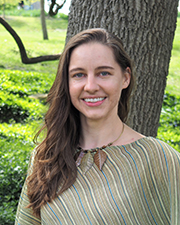
Rhiannon J. LaVine, PhD
 Rhiannon received her B.S. in geology from the University of Wisconsin-Whitewater and her Ph.D. in paleobiology from the Department of Geophysical Sciences at the University of Chicago. Her research interests revolve around questions relating to the mechanisms that generate and influence patterns of morphological diversity in organisms and how that shapes evolutionary trajectories. As such, her dissertation focused the role of developmental constraints in Cambrian fossil arthropods through the use of geometric morphometric methods. The IRACDA program has given Rhiannon the opportunity to work with Dr. Bruce Lieberman to investigate macroevolutionary trends in trilobite morphology. Beyond research, she is committed to promoting equity initiatives and making STEM accessible to students from all backgrounds. As a "punk rock paleontologist", she is driven to challenge the antiquated image of a “scientist” and inspire those who strive to do the same. Rhiannon joined Evozyme as a Data Scientist after completing her program in August 2022.
Rhiannon received her B.S. in geology from the University of Wisconsin-Whitewater and her Ph.D. in paleobiology from the Department of Geophysical Sciences at the University of Chicago. Her research interests revolve around questions relating to the mechanisms that generate and influence patterns of morphological diversity in organisms and how that shapes evolutionary trajectories. As such, her dissertation focused the role of developmental constraints in Cambrian fossil arthropods through the use of geometric morphometric methods. The IRACDA program has given Rhiannon the opportunity to work with Dr. Bruce Lieberman to investigate macroevolutionary trends in trilobite morphology. Beyond research, she is committed to promoting equity initiatives and making STEM accessible to students from all backgrounds. As a "punk rock paleontologist", she is driven to challenge the antiquated image of a “scientist” and inspire those who strive to do the same. Rhiannon joined Evozyme as a Data Scientist after completing her program in August 2022.
Program Completed in 2021
Patrick Lansdon, PhD
 Patrick attended Truman State University and received a BS in Biology before earning his PhD in Genetics from The University of Iowa. His doctoral thesis investigated the interactions between voltage-gated sodium channel mutations and the endogenous gut microbiota in fruit flies. Patrick accepted a fellowship in the IRACDA program at the University of Kansas to study the evolutionary relationship of host-pathogen interactions in nematodes in the lab of Dr. Brian Ackley (Department of Molecular Biosciences). He plans to pursue a career in undergraduate education where he will use fruit flies and nematodes to introduce students to scientific research. After completing the IRACDA program, Patrick joined Brian Ackley's research group as a postdoctoral fellow at KU.
Patrick attended Truman State University and received a BS in Biology before earning his PhD in Genetics from The University of Iowa. His doctoral thesis investigated the interactions between voltage-gated sodium channel mutations and the endogenous gut microbiota in fruit flies. Patrick accepted a fellowship in the IRACDA program at the University of Kansas to study the evolutionary relationship of host-pathogen interactions in nematodes in the lab of Dr. Brian Ackley (Department of Molecular Biosciences). He plans to pursue a career in undergraduate education where he will use fruit flies and nematodes to introduce students to scientific research. After completing the IRACDA program, Patrick joined Brian Ackley's research group as a postdoctoral fellow at KU.
Melissa Plakke, PhD
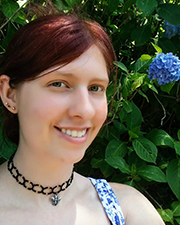 Melissa earned her BS in Zoology and Biological Sciences from Colorado State University before attending the University of Pittsburgh and acquiring a PhD in Ecology and Evolutionary Biology and a minor in College Biology Teaching. Her dissertation focused on the co-evolution between male and female reproductive traits in butterflies and how divergence at a molecular level can lead to potential speciation. As an IRACDA fellow at the University of Kansas, Melissa is working with Dr. Jamie Walters in the Department of Ecology and Evolutionary Biology to explore the molecular and evolutionary drivers behind sperm development in butterflies and moths. Melissa strives to develop a more equitable classroom environment for all students, particularly those underrepresented in STEM, and aims to extend her experience to a position at a primarily undergraduate serving institution. After completing the program, Melissa joined Governors State University as an assistant professor in the Division of Sciences Mathematics and Technology.
Melissa earned her BS in Zoology and Biological Sciences from Colorado State University before attending the University of Pittsburgh and acquiring a PhD in Ecology and Evolutionary Biology and a minor in College Biology Teaching. Her dissertation focused on the co-evolution between male and female reproductive traits in butterflies and how divergence at a molecular level can lead to potential speciation. As an IRACDA fellow at the University of Kansas, Melissa is working with Dr. Jamie Walters in the Department of Ecology and Evolutionary Biology to explore the molecular and evolutionary drivers behind sperm development in butterflies and moths. Melissa strives to develop a more equitable classroom environment for all students, particularly those underrepresented in STEM, and aims to extend her experience to a position at a primarily undergraduate serving institution. After completing the program, Melissa joined Governors State University as an assistant professor in the Division of Sciences Mathematics and Technology.
Program Completed in 2020
Clinton Rice, PhD
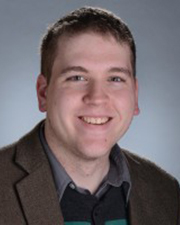 Clinton received a B.S. in Biology and a B.A. in Journalism from American University before earning his Ph.D. in Biology from the University of Iowa. His doctoral thesis focused on variation in polyglutamine repeats in fruit fly genes. Clinton arrived at the University of Kansas to study the roles of junctional proteins in fly epithelial morphogenesis in the lab of Dr. Robert Ward (Department of Molecular Biosciences). He is passionate about teaching and is pursuing a career in undergraduate education. To this end, he accepted a fellowship in the IRACDA program and is currently teaching a course at KU. In 2020, he joined Catalent Pharma Solutions as a Senior Technical Writer.
Clinton received a B.S. in Biology and a B.A. in Journalism from American University before earning his Ph.D. in Biology from the University of Iowa. His doctoral thesis focused on variation in polyglutamine repeats in fruit fly genes. Clinton arrived at the University of Kansas to study the roles of junctional proteins in fly epithelial morphogenesis in the lab of Dr. Robert Ward (Department of Molecular Biosciences). He is passionate about teaching and is pursuing a career in undergraduate education. To this end, he accepted a fellowship in the IRACDA program and is currently teaching a course at KU. In 2020, he joined Catalent Pharma Solutions as a Senior Technical Writer.
Grey Gustafson, PhD
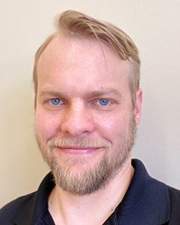 Grey received his B.S. degree in Biology with an emphasis in Ecology and Evolutionary Biology from the University of Kansas and his Ph.D. in Biology from the University of New Mexico. His dissertation work focused on the systematics and phylogenetics of the aquatic beetle family Gyrinidae, commonly known as whirligig beetles. As an IRACDA fellow, he returned to the University of Kansas to join Dr. Andrew Short’s lab of insect systematics and biodiversity. His postdoctoral research involves documenting aquatic beetle biodiversity and reconstructing their evolutionary history. Knowledge of aquatic insect biodiversity and evolution has broader impacts in regards to both health and science. Information about aquatic insect communities can be used to assess water quality and aquatic ecosystem health. Reconstructing their evolutionary history allows investigation into factors influencing diversification and can be used to test biogeographic hypotheses. As of Aug 2018, Grey has 23 peer-reviewed publications and he coauthored 4 publications with his IRACDA mentor, Dr. Andrew Short. He joined the Northern Arizona University in 2020 as assistant professor of the Department of Biological Sciences.
Grey received his B.S. degree in Biology with an emphasis in Ecology and Evolutionary Biology from the University of Kansas and his Ph.D. in Biology from the University of New Mexico. His dissertation work focused on the systematics and phylogenetics of the aquatic beetle family Gyrinidae, commonly known as whirligig beetles. As an IRACDA fellow, he returned to the University of Kansas to join Dr. Andrew Short’s lab of insect systematics and biodiversity. His postdoctoral research involves documenting aquatic beetle biodiversity and reconstructing their evolutionary history. Knowledge of aquatic insect biodiversity and evolution has broader impacts in regards to both health and science. Information about aquatic insect communities can be used to assess water quality and aquatic ecosystem health. Reconstructing their evolutionary history allows investigation into factors influencing diversification and can be used to test biogeographic hypotheses. As of Aug 2018, Grey has 23 peer-reviewed publications and he coauthored 4 publications with his IRACDA mentor, Dr. Andrew Short. He joined the Northern Arizona University in 2020 as assistant professor of the Department of Biological Sciences.
Program Completed in 2018
Mario Moral, PhD
Mario earned a B.S. in Chemistry from the Ateneo de Manila University in the Philippines, where he also taught undergraduate Chemistry and did mission work for underprivileged communities. He later focused on biochemistry while earning his PhD in Chemistry from the University of Florida, studying the B. subtilis enzyme oxalate decarboxylase and its catalysis. He is currently an IRACDA postdoctoral fellow in the Department of Pharmaceutical Chemistry with Dr. Teruna Siahaan, studying bifunctional peptide inhibitors (BPI) and I-domain antigen conjugate (IDAC) molecules, which have been found to suppress animal models for autoimmune diseases such as Multiple sclerosis, Type-1 diabetes, and rheumatoid arthritis. His work focuses on the solid-phase synthesis and characterization of antigenic peptides and protein-peptide conjugates. His work aims to optimize conditions for the development of potential prophylactic and therapeutic agents against multiple sclerosis and other autoimmune diseases. Mario is interested in applied multidisciplinary research focused on human diseases, and the development of diagnostic and therapeutic technologies. He continues in this pursuit with a desire for training/mentoring young researchers whenever possible. In 2018, he took an associate position at Cheeky Scientist.
Catherine L. Shelton, PhD
Catie received her BA in Biology/Pre-med from Trinity International University and her PhD in Molecular Genetics, Biochemistry & Microbiology from the University of Cincinnati College of Medicine. Catie is passionate about undergraduate research and education. She specifically sought out the IRACDA program for her postdoctoral work as a way to achieve her career goals of both high quality research and teaching. As an IRACDA fellow Catie worked in the laboratory of Dr. Audrey Lamb to develop methods for reconstituting enzymatic pathways in vitro. During her two-year tenure as an IRACDA fellow she submitted an NRSA-grant application, published a review in Trends in Biochemical Sciences, and served as a Biochemistry instructor at Haskell Indian Nations University. In 2018, she joined the Department of Chemistry and Biochemistry at Northern Kentucky University as an assistant professor.
Program Completed in 2017
Katie Becklin, PhD
Katie holds a B.S. in Biology from the University of Puget Sound and a Ph.D. in biology from the University of Missouri. She was an IRACDA postdoctoral fellow that conducted research with Prof. Joy Ward in the Dept. of Ecology and Evolutionary Biology at KU. Her research aimed to 1) understand physiological, ecological, and evolutionary mechanisms generating variation in species interactions, and 2) trace the impact of such variation on ecological interaction webs. She pursued these research goals by studying mycorrhizal associations, symbiotic interactions between plants and root-colonizing fungi, using an interdisciplinary approach that spanned multiple spatial and temporal scales. Katie focused on how long-term changes in atmospheric [CO2] since the last glacial period alters the functioning of mycorrhizal associations, and how such changes may generate feedbacks that alter plant productivity and plant and fungal community composition. After pursuing additional postdoctoral training at the University of Kansas, Katie joined the Biology Department at Syracuse University as an assistant professor.
Lorne D. Jordan, PhD
Lorne holds a B.S. in Biology and Chemistry from Bowling Green State University, a M.Sc. in Chemistry and Biochemistry from the University of Oklahoma, and a Ph.D. in Biochemistry and Molecular Biophysics from Kansas State University. His current research is in Professor Lynn Hancock’s research group in the Department of Molecular Biosciences at the University of Kansas. Lorne’s primary research goals include identifying and characterizing transcription factors controlled by peptides related to quorum sensing in Enterococcus faecalis, which causes a variety of human diseases and is among the top 3 most prevalent causes of hospital-acquired infections in the United States. These efforts are designed to reveal novel drug targets for disrupting bacterial communication, offering alternatives to traditional antibiotic therapeutics. He joined Ventria Bioscience as a analytical biochemistry scientist in 2018.
Dana Tucker, PhD
Dana gained valuable teaching experience while earning a M.S. in Cellular & Molecular Biology from Missouri State University. She earned her PhD in Biochemistry, Cell and Developmental Biology from Emory University where she investigated the pathomechanisms of the desmosomal, autoimmune skin blistering disease Pemphigus vulgaris. As an IRACDA postdoctoral fellow in Dr. Brian Ackley's lab in the Dept. of Molecular Biosciences at KU, she is working to further our knowledge of neural development by identifying novel genes involved in axonal outgrowth and synapse formation using C. elegans. Furthermore, she is interested in understanding how members of the cadherin superfamily of cell adhesion molecules, the C. elegans flamingo member, FMI-1, and the conserved cadherin protein, CDH-4, contribute to the development of GABAergic motor neurons. Moving forward, Dana is excited to utilize her expertise in cell biology and the model system C. elegans to cultivate undergraduate education and research. After her IRACDA fellowship, Dana joined the University of Central Missouri in 2017 as an assistant professor.
Program Completed in 2016
Abu Gafar M. Hossion, PhD
Abu received B.S. and M.S. degrees in chemistry from Jahangirnagar University, Bangladesh. Majoring in medicinal chemistry, he subsequently obtained M.S. and Ph.D. degrees in Pharmaceutical Sciences from Okayama University, Japan. He later pursued postdoctoral studies at the College of Pharmacy of the University of Oklahoma Health Sciences Center. During these postdoctoral studies, he designed and synthesized novel prodrugs that include photocleavable aminoacrylate linkers and deactivated photosensitizers for spatiotemporally controlled release of drugs in cancer cells using visible light. Abu is currently is working as an IRACDA postdoctoral fellow in the Dept. of Medicinal Chemistry with Prof. Blake Peterson on the synthesis of analogues of the auristatin anticancer agents. These compounds will be used to prepare novel conjugates that combine these cytotoxins with antibodies against cell surface proteins overexpressed in cancer, and the activities of these conjugates will be investigated in models of human cancer. He is primarily interested in multidisciplinary research at the chemistry/biology interface, with an emphasis on the discovery and development of small molecule-based tools that manipulate biological processes and novel therapeutic agents with potential for treatment of human disease. After his IRACDA fellowship, Abu joined the Cloud County Community College in 2016 as an Instructor in Chemistry.
Program Completed in 2015
Kyle Bichsel, PhD
Kyle earned a B.S. in biology from Northwest Missouri State University and a Ph.D. in biomedical sciences from Creighton University, where he studied Epidermal Growth Factor Receptor (EGFR) signaling in mice. EGFR is important for skin and hair development and is a major driver of cancer proliferation. In 2013, Kyle joined the laboratory of Prof. Berl Oakley in the Dept. of Molecular Biosciences at KU. He studied the role of SUMOylation, a reversible post-translational modification that influences multiple cellular processes, in the genetic model organism, Aspergillus nidulans. His work focused on this modification and its role in cytoskeletal organization, cell cycle regulation, and chromosome segregation. In addition to research, he is interested in applying new strategies to improve undergraduate education in the life sciences. He believes in the importance of undergraduate research and seeks to provide a complete educational experience for students. He took a position as Upper School Biology teacher at Lausanne Collegiate School in 2015.
Alex J Brewer, PhD
Alex earned a B.S. in environmental science from Haskell Indian Nations University, an M.S. in environmental science from the University of Oklahoma and a Ph.D. from Oregon State University in Toxicology in the Jennifer Field laboratory. His dissertation was focused on addressing the limitations of wastewater epidemiology by using high-frequency diurnal sampling, in-situ experiments and analyzing wastewater accompanied by urinalyses. Alex's research was focused on multidisciplinary topics within the areas of environmental science, toxicology and environmental engineering working in the laboratory of Prof. Craig Lunte in the Dept. of Chemistry at KU. His research focused on developing analytical methods to quantify markers of human health in wastewater to gain a better understanding of community health. He joined Central Washington University as an instructor after completing the IRACDA program.
Program Completed in 2014
Nicole Windmon, PhD
Nicole earned a B.S in Chemistry from Florida Atlantic University and a Ph.D. in Chemistry from The University of Notre Dame. She is currently an IRACDA postdoctoral fellow conducting research with Professor Paul R. Hanson in the Department of Chemistry at KU. Her research aims to develop new chemistry to access sulfur and phosphorus- based probes with biological utility. Modular approaches are currently being developed to access molecular libraries of covalent modifiers. In particular, a library of electrophilic vinyl sulfonamides is currently being generated with the goal of developing probes for cysteine-activated enzymes. In addition, Nicole will be facilitating collaborative efforts for the biological evaluation of all libraries. Ultimately, Nicole hopes to develop probes to further evaluate biological processes involving protein-protein interactions such as, but not limited to ubiquitination and sumoylation. Nicole is passionate about undergraduate education. Her career goals include strengthening and modernizing science education at minority institutions and increasing the number of underrepresented minority groups in the science community. In 2014, she took a Upper School Chemistry Professor position at the Episcopal High School in Baton Rouge.
Program Completed in 2013
Safiyyah Forbes, PhD
Safiyyah worked with Dr. Blake Peterson in the Dept. of Medicinal Chemistry at KU to design and synthesize a series of fluorescent molecular probes. She was involved in studies of peptide-based promoters and inhibitors of apoptosis, the synthesis of hydrophobic analogues of rhodamines as optical probes of mitochondrial fusion and fission dynamics in vivo, and studies of fluorescent calcium sensors designed for localized detection of calcium release during signaling. After completing the IRACDA program, she joined Monmouth College, in Illinois, as an assistant professor of chemistry.
Vanessa Koelling, PhD
Vanessa's research interests primarily lie in the areas of speciation and plant mating system evolution. While an IRACDA fellow working with Prof. John Kelly in the Dept. of Ecology and Evolutionary Biology at KU, she studied the evolution of inbreeding depression in natural populations of the yellow monkeyflower, Mimulus guttatus. This plant is an emerging model species in evolutionary biology because it expresses variation in floral form and mating system, grows at a wide range of elevations (from sea level to alpine habitats), and has a fully sequenced genome. Using field collections and laboratory-based methods, she investigated how inbreeding depression changes with changes in population mating system to further our understanding of the genetics of inbreeding depression and its consequences for natural populations. In 2013 she joined the University of Puget Sound, Washington, as a visiting Assistant Professor.
Juliana Medeiros, PhD
Juliana employed an integrated approach to understand the complex relationships between plants and their environment and the evolution of plant adaptations. In her research in the laboratory of Prof. Joy Ward in the Dept. of Ecology and Evolutionary Biology at KU, she used DNA extracted from ancient plant macrofossils found in pack rat middens to determine the magnitude, timing and speed of changes in population sizes of Pinus sp. over the Pleistocene/Holocene transition. Her ultimate goal was to understand how physiological adaptation and genetic structure resulting from the interaction of plants with past environments could impact the ability of species to adapt and persist in the face of future climate change. After completing the IRACDA program, she joined the Holden Arboretum in Ohio as a Plant Biologist.
Dyan Morgan, PhD
Dyan studied the development of the nervous system in the lab of Prof. Erik Lundquist in the Dept. of Molecular Biosciences at KU. During neurogenesis, axons are guided to their proper positions by cues that trigger cytoskeletal rearrangements. She worked to understand how cells interpret these cues using C. elegans as a model system to dissect the evolutionarily conserved genetic pathways governing repulsive axon guidance. Dyan accepted a position as Undergraduate Research Coordinator at the University of Kansas after completing the IRACDA program.
Program Completed in 2012
James Deng, PhD
James worked with Prof. Susan Egan in the Dept. of Molecular Biosciences at KU, to identify the mechanism of allosteric signaling in members of the very large AraC/XylS family of transcription activators. Many AraC/XylS proteins are required for the expression of virulence factors in bacterial pathogens. Therefore, their goal was to identify the mechanisms that underlie transcription activation to enhance the development of inhibitors of AraC/XylS proteins that may have potential as antibacterial agents. He joined Thermo Fisher Scientific as a Product Manager after completing the IRACDA program.
Damon Jacobs, PhD
Damon performed postdoctoral research in the laboratory of Prof. Jeff Krise in the Dept. of Pharmaceutical Chemistry at KU. He studied the intracellular distribution and trafficking of small molecular weight compounds in a Niemann-Pick type C (NPC) model system. NPC is a genetic disorder that leads to the hyper-accumulation of cholesterol in lysosomes of many tissues. These studies were designed to reveal the molecular mechanisms of NPC etiology and potentially provide new strategies to combat the progression of this disease. Damon also taught a course in Biostatistics at Haskell Indian Nations University. He accepted a Research Associate position at the University of Kansas Medical Center after completing the IRACDA program.
Zachary Woydziak, PhD
Zach worked in the laboratory of Prof. Blake Peterson in the Dept. of Medicinal Chemistry on the chemical synthesis of fluorescent compounds and molecular probes of biological systems. He created new methodology for the synthesis of fluorinated xanthone-derived fluorophores, prepared novel acid-activated fluorophores capable of sensing changes in pH in vivo in the alimentary canal of C. elegans, and developed a practical synthesis of the Pennsylvania Green fluorophore as a tool for studies of cellular biology. Zach joined Nevada State College as an assistant professor of chemistry in 2012.
Program Completed in 2011
Maria Pontes Ferreira, PhD, R.D.
During the first year of her postdoctoral fellowship, Maria worked with Prof. Elias Michaelis in the Dept. of Pharmacology & Toxicology. They investigated the effects of ethanol on dendritic trafficking and translation of the 24-mer sequence of the NMDAR subunit NR1 in hippocampal neurons using in vitro models. During her second year, she taught Biology and Laboratory, and Sport Nutrition at Haskell Indian Nations University. During her final postdoctoral year, she worked with Prof. Kelly Kindscher's team in the Native Medicinal Plant Research Program at KU. She accepted a position as assistant professor at Wayne State University in the Department of Nutrition and Food Science in 2011.
Corey Welch, PhD
As an IRACDA scholar, Corey worked with Prof. Robert Timm, in the Dept. of Ecology and Evolutionary Biology. Dr. Welch's research in biogeography and evolution employed field and molecular methods to explore patterns and causes of geographic variation of mammalian populations and species from the Pacific Northwest of North America. Dr. Welch spent the summer of 2009 in the field collecting museum specimens to understand the recent evolutionary histories of shrew-moles, western moles, and the mazama pocket gopher. He accepted a Program Coordinator position at UC Berkeley after completing the IRACDA program.
Program Completed in 2010
Alison Scoville, PhD
Alison worked with Prof. John Kelly in the Dept. of Ecology and Environmental Biology at KU. Her research combined theoretical and empirical approaches to investigate fundamental questions in evolutionary biology, with an emphasis on phenotypic plasticity, epistasis, rapid evolution, and conservation. Other projects centered on understanding the contribution of phenotypic plasticity to rapid adaptation of Daphnia (water fleas) to introduced fish predators and dissecting the population-level architecture of genetic variation in floral traits of Mimulus guttatus (yellow monkeyflower). Dr. Scoville taught Introduction to Cellular and Molecular Biology (laboratory) and Conservation Genetics of Salmon at Haskell Indian Nations University. She joined Central Washington University as an assistant professor of biological sciences in 2010 after completing the program.
Program Completed in 2008
Ellen Tarr, PhD
As an IRACDA post-doc, Ellen worked with Prof. Helen Alexander, in the Dept. of Ecology and Evolutionary Biology. Her research in the Alexander lab focused on the identification of disease resistance genes in Carex blanda. She used the sedge Carex blanda and its smut pathogen, Anthracoidea blanda, as her disease system. Dr. Tarr's broader research interests are in host-pathogen interactions, with a particular interest in parasitic nematodes. While pursuing her research, she taught Biology 101 and Ecology of Infectious Disease to undergraduate students at Haskell. After completing the IRACDA program, she accepted an assistant professorship in the Department of Microbiology and Immunology at the Midwestern University School of Osteopathic Medicine.
Program Completed in 2007
Muir Eaton, PhD
Muir trained under Dr. A.T. Peterson, professor of Ecology and Evolutionary Biology and Assistant Curator of the Ornithology Division of the KU Natural History Museum and Biodiversity Research Center. His research centered on the evolution of plumage colors in birds. He studied how hidden color variation in conspecific plumages relates to our understanding of sexual selection, and whether there is any evidence of correlated evolution of plumage colors, visual sensitivity, and habitat use (i.e. light environment and/or ecological niche). He also taught the Ecology Lab and the General Biology Lab at Haskell. In 2007, Muir accepted an assistant professor position at Drake University, where he will also serve as the Curator of Vertebrates for the Drake Biodiversity Center.
Maria Eifler, PhD
Maria worked under Prof. Deborah Smith in the Dept. of Entomology at KU. Her research focused on using molecular genetics to answer questions in animal behavior and ecology. Her projects focused on kinship in overwintering rattlesnakes and the evolution of sociality in spiders. She also had the opportunity to teach Animal Behavior and Principles of Ecology to Haskell undergraduates. After completing the IRACDA program, Maria accepted a position as Collections Specialist at the KU Museum of Natural History, Mammal Division.
Aaron Reed, Ph.D
As an IRACDA scholar, Aaron worked in the KU Dept. of Ecology and Evolutionary Biology with Prof. Norm Slade, Curator of the Mammalogy Division of the KU Natural History Museum and Biodiversity Research Center. Dr. Reed researched population ecology in small mammals and used a long-term data set of 4 species of small mammal to examine interrelationships of vital rates (e.g., survival), density dependence in recruitment, and relation of vital rates to environmental variables. The ultimate goal of this work was to assess the effect of variability in vital rates, and the pattern of that variability, on structured demographic models. He also examined the role of small mammal disturbance on nitrogen cycling. He gained additional experience teaching Biostatistics, Wildlife Ecology, and Vertebrate Zoology. In 2007, he accepted a Research Assistant Professor position at the University of Missouri, Kansas City.
Program Completed in 2006
Sandra Bartlett (Vigil-Cruz), PhD
Sandy performed research in the laboratory of Prof. Jane Aldrich in the Dept. of Medicinal Chemistry at KU and taught Introduction to Biology at Haskell Indian Nations University. She has held faculty appointments in medicinal chemistry at the University of Maryland, Baltimore, University of Connecticut, and the University of Kansas. She has studied targeting the CCR5 chemokine receptors as a potential therapeutic target for the human immunodeficiency virus (HIV) investigated the design and synthesis of peptides as antagonists at the CXCR4 chemokine receptors as potential inhibitors of breast cancer metastasis. Sandy accepted an associate professor of pharmacy practice position at Husson University, Maine a few years after completing the IRACDA program.
Claudia Bode, PhD
Claudia studied with Prof. Kathy Mitchell in the Dept. of Pharmacology and Toxicology at KU. Her research focused on the differentiation capacity of stem cells isolated from the matrix of the umbilical cord. While pursuing research in the Mitchell lab, Claudia also gained experience teaching General Biology and Bioinformatics at Haskell Indian Nations University. In 2006, Claudia accepted an Education Director position at KU.
Brena Mauck, PhD
Brena worked in the geomicrobiology laboratory of Prof. Jennifer Roberts in the Dept. of Geology. Dr. Roberts' lab focuses on microbe:mineral interactions and the geological and ecological implications of these interactions in subsurface environments. Dr. Mauck analyzed changes in microbial community diversity due to particular environmental conditions and stresses. Her work explored whether in nutrient limited environments microbes attach to minerals that provide the limiting nutrient. During this research she studied a petroleum contaminated aquifer in Bemidji, MN. She also taught Cellular and Molecular Biology Lab and General Biology at Haskell. In 2006, she accepted an assistant professor of biology position at the College of Saint Mary.
Michael Wacker, PhD
While in the IRACDA program, Michael worked with Prof. James Orr in the Dept. of Molecular Biosciences at KU. Dr. Wacker investigated if the endogenous agent thromboxane A2 directly stimulates cardiac nerves or cardiac myocytes to induce arrhythmias or other alterations in cardiac function. He also worked on projects related to genetic polymorphisms that relate to obesity with Dr. Phil Gallagher in the Applied Physiology Lab, and he researched serotonin knockout mice with Prof. Steve Fowler in Dept. of Pharmacology and Toxicology. Dr. Wacker further taught Principles of Cellular and Molecular Biology, Bioinformatics, Research Design and Methods in Science. After completing the program, he accepted an assistant professor position at the University of Missouri, Kansas City.
Program Completed in 2005
Ann Manzardo, PhD
Under the direction of Dr. William Gabrielli, chairman of the Department of Psychiatry and Behavioral Sciences at the KU Medical Center, Ann utilized a 45-yr old Danish longitudinal database to study the contributions of early childhood brain growth and injury to the later development of alcoholism in adulthood. During her IRACDA postdoctoral fellowship, she gained experience teaching Organic Chemistry and Biochemistry. After completing the program, she took a position as research assistant professor in the Department of Psychiatry and Behavioral Science at the University of Kansas Medical Center.